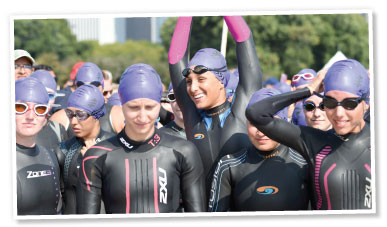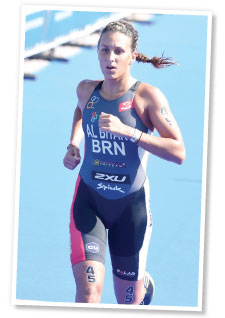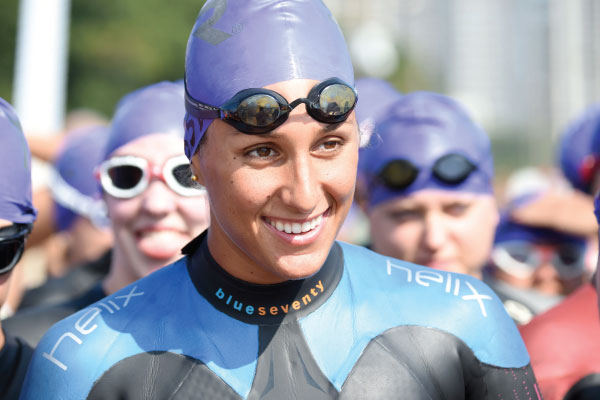Our editor Fernanda Langhammer spoke to Bahraini athlete, Sameera Al Bitar about her swimming career and her new venture in the triathlon world.
Sameera Al Bitar is a 25-year-old athlete who has dedicated her life to swimming competitions since a very young age. Her passion led her to represent Bahrain at two Olympic Games and many other important competitions. The sport also gave her the opportunity to study at George Washington University in USA and travel the world. Now she’s decided to expand her path into triathlon, a sport that involves swimming, biking and running. She tells us more.
Woman This Month (WTM): When did your passion for swimming start?
Sameera Al Bitar (SB): It started at a very young age when I joined a friend at a swim session. Before I knew, I was on the school team, which led me to join a club team to improve and get a bit more training. I realised then that it was something I enjoyed doing.
At the age of 12, Bahrain formed its first women’s squad, which I joined and have been swimming with since then. I wouldn’t consider swimming my profession as I was never at the elite level to quit school/work, as my times weren’t fast enough.
WTM: In which major swimming events have you represented Bahrain?
SB: I have been competing for the past 13 years, and during my swimming career I represented Bahrain in two Olympic Games (Athens 2004 and Beijing 2008), five world championships (Barcelona 2003, Montreal 2005, Melbourne 2007, Rome 2009 and Barcelona 2013) and the 2006 Asian Games. As I am new with the triathlon team, the major competitions which I’ve competed in consist of the Asian Beach Games (Pukhet), the Pan Arab Championships (Sharm El Sheikh) and, more recently, the World Championships held in Chicago.
 WTM: Can you describe the feeling of participating in the Olympic Games?
WTM: Can you describe the feeling of participating in the Olympic Games?
SB: The two consecutive Olympic Games were by far two of the most memorable experiences I’ve ever lived through, it was a different world. Living at the athletes’ village, making new friends from around the globe while learning about new cultures, watching top athletes train and compete was a true eye-opener. Being able to walk at the opening ceremony was the highlight of both games as it’s a truly remarkable feeling walking in the stadium with all the teams. Competing at the Games was extremely nerve-racking I must say, you get too caught up in the environment, there are cameras everywhere, a huge crowd and extremely fast athletes. You learn a lot out of such experience that you really can’t get anywhere else and I’m very fortunate for having the opportunity to go twice.
WTM: What were the main challenges you found in your path?
SB: One of the biggest challenges was the lack of facilities; at one point, the association did not have a swimming pool as they were rebuilding the current Olympic-sized pool we use today. A training facility was not available all the time, as many of the clubs that do have a training pool didn’t have a heater/chiller so at times it would be either too hot or too cold.
Another challenge was the lack of competitions held in Bahrain because there aren’t many females that practise this sport so most of the competing was done at an international level.
WTM: And what were the best things that happened that you could highlight during this journey?
SB: Once you dedicate yourself to a sport from a very young age, you learn life lessons, which are extremely valuable for the future. This journey has really benefited me as I travelled the world and learned about new cultures. I’ve met people from different backgrounds and I also learned life skills which include time management, responsibility, dedication and commitment to name a few.
 WTM: You are now re-directing your career and competing in triathlon, what made you opt for a new sport?
WTM: You are now re-directing your career and competing in triathlon, what made you opt for a new sport?
SB: After completing my swimming career in university, it was difficult to train the required hours while working, so my times weren’t really improving. Therefore, I was just swimming to keep fit (an hour five times a week) while participating in aquathlons (swim/run) and run races for fun. Then I decided to finally switch and get into triathlon, as it seemed like a growing sport that everyone spoke highly of. Since it involved swimming, I didn’t feel I was completely changing to a new sport. It’s been a year since I started in triathlon and I’m really enjoying it and I’m still learning, as there’s always something to improve on in this sport.
WTM: What are the biggest personal challenges in this new sport for you?
SB: Triathlon is quite challenging due to the fact that it involves three completely different sports, therefore my challenge is in the bike and run leg, since I’ve never trained for these sports before. Learning how to draft, assembling/disassembling my bike and changing the tires are among some of the challenges I have faced since starting triathlon. As for running, I’ve had to change completely my technique because I was doing it wrong so I’m adapting to the new practise and training to drop my time significantly to be at the elite level.
WTM: How do you see the triathlon scene in Bahrain? The sport is clearly getting a lot of attention all over the world with high-end competitions; do you see it growing here as well?
SB: Triathlon is really growing in Bahrain and I’m very impressed to see so many women getting into this sport! The nice thing about it is that age doesn’t matter and anyone can do it. You just need the right attitude and effort to train.
Crossing the finish line is more important than anything else is. Thankfully, with the support of HH Shaikh Nasser Bin Hamad Al Khalifa, Bahrain hosted its first international triathlon race last December. Two more races are coming up soon and, along with the annual races Bahrain Road Runners hosts, we are seeing a great increase in the triathlon community in Bahrain. Drive on Zallaq road in the early mornings on the weekend and you will be shocked as to how many people have started biking; it’s a very nice feeling!
WTM: What are your plans and expectations competing in this sport?
SB: My plan is to keep training to improve my bike skills and running technique while trying to gain more experience competing at the Asian level with hopes of making the top 10 in Asia in the next two years.
WTM: What is the routine of an athlete?
SB: Usually professionals in this sport train three times a day six times a week. However, since most members on our team have other commitments, whether it’s school or work, we train twice a day. We have a swim session in the morning and during the afternoon we alternate between bike training and run/gym sessions during the week. The weekend usually includes long bike rides and open water swimming.
WTM: Would you see yourself doing anything else apart from working with sport?
SB: I have a double major in finance and sports management; therefore, I will start exploring opportunities in the finance field to see if it’s something of interest.
WTM: What is your advice to those starting out in sports in Bahrain?
SB: For a Bahraini woman starting her sports career as an athlete, the opportunities are limitless and you really have opportunities available that are not offered anywhere else in the world.
More people need to take advantage of that because people want to have what Bahrain offers its female athletes. It’s a matter of dedication and commitment and you will be rewarded with unforgettable experiences and lifelong lessons.
One word answer:
– Biggest Achievement? Olympics
– Mountain or beach? Beach
– What makes you happy? Food
– Always in your handbag? Candy
– Heels or Trainers? Trainers
– Quick snack fix? Fruit
– What do you do to re-energize? Swim
– Beauty product? Kiehl’s
– A place you will always remember? Athens.


































